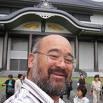Chapter 7: Phantom City [Kejoyu]
'Phantom' refers to our body, and
'city,' to our mind. To expound the impermanence of body and mind is the heart of the provisional teachings. The intent
of the Lotus Sutra is to teach that the impermanent abides eternally. Thus the phantom city is itself the treasure land. Today,
when Nichiren and his disciples chant Nam-myoho-renge-kyo, we open both body and mind to reveal them as the Mystic
Law. This is called the phantom city being itself the treasure land. (Gosho Zenshu p. 732)
The ten worlds are all Phantom Cities and
each one is a Treasure Land. Or again, the Phantom City is the nine worlds and the Treasure Land is the state of Buddhahood.
From the Phantom City to the Treasure Land is a distance of five hundred yojanas. (LS p.135) This distance represents
the delusions arising from thoughts and desire, of delusions as innumerable and dust particles and grains of sand, and the
delusions arising from ignorance which impede Buddhist practice. The five hundred yojanas of earthly desires, in essence,
indicate the five characters of Myoho Renge Kyo, means the Phantom City is the Treasure Land. In the phrase 'the
Phantom City is precisely the place of Jewels,' the word 'precisely' means Nam Myoho Renge Kyo. (Gosho
Zenshu p. 732)
Each life-moment in the Phantom City is
a life-moment in the Treasure Land. The provisional teachings expound our mental and physical existences as impermanent. The
Lotus Sutra teaches that they constantly exist. When one eliminates attachment to impermanence then the Phantom City is 'wiped
out.'
The Phantom City is our skin and flesh,
while the Treasure Land is our bones. The opening and realization that one's body and mind are the True Law is the reality
of the Phantom City being the place of Jewels. 'Reality' means the simultaneity and coexistence of the impermanent
and the constantly existing, according with conditions yet unchanging, understanding and illumination in a single thought-moment.
'Single thought moment' here means a single thought moment in which one believes without doubt in Nam Myoho Renge
Kyo. [In the expression, 'the conjured city is precisely the place of jewels,'] one should fix one's mind on the
single word 'precisely' [soku] and ponder it. (Gosho Zenshu p. 732)
There is nothing that exists eternally on
this earth. Whether something exists or not depends solely upon the time. (Gosho Zenshu p. 732)
The sutra states "There was a Buddha,
most honored of two-legged beings, named Great Universal Wisdom Excellence." (LS p. 118, 3LS p. 146)
The votaries who chant Nam Myoho Renge
Kyo are the Buddha Great Universal Wisdom Excellence. (Gosho Zenshu p. 733)
The sutra states, "Their grandfather
who was a wheel-turning sage king," (LS p. 120, 3LS p. 148)
The 'wheel turning sage-king' is
one who passes through the cycle of birth and death, unchanging throughout the three existences of past, present, and future.
The wheel-jewel refers to our words and voices. With regard to the wheels of gold, copper, silver and iron; gold
indicates life, silver represents death, or bleached bones. Copper gives the appearance of old age, and iron
indicates sickness. Thus, the four wheels [of the four wheel turning kings] signify the Buddha's acts of enabling all persons
to open, show, awaken to, and enter the Buddha wisdom." (Gosho Zenshu p. 733)
The sutra states, "At that time the
leader, knowing that the people have become rested and are no longer fearful or weary, wipes out the phantom city."
(LS p. 136, 3LS p. 163)
The entity of one's person, which shall
undergo dissolution, is the conjured city. Because one sees this dissolution as extinction, it remains the phantom city. But
when one perceives it to be the extinction that is non-extinction, which is called the place of jewels. The Juryo chapter expounds this with the words 'as an expedient means I appear to enter nirvana but in truth I do not pass
into extinction.' (LS p. 229) To eradicate the view of extinction is called 'wipes out.' One should ponder
in this light the teaching that the three provisional vehicles are precisely the one true [vehicle]. In another sense, 'The
leader…wipes out the phantom city' means eradicating the palaces of those who slander the Law.
Now when Nichiren and his disciples chant
Nam Myoho Renge Kyo they are asserting that the phantom city is identical to the treasure land. These mountains, valleys,
and broad plains, where we live, every one of them, is the treasure land of Eternally Tranquil Light. (Gosho Zenshu
p. 734)
The sutra states, "Now you must press
forward diligently so that together you may reach the place where the treasure is." (LS p. 141, 3LS p. 168)
Nichiren and his disciples who chant Nam
Myoho Renge Kyo will 'reach the place where the treasure is.' 'Together' means that when one is 'together'
with Nichiren, one can reach the place of Treasures [Buddhahood] while those who are not with Nichiren will fall into
the hell of incessant suffering. Now when Nichiren and his disciples chant Nam Myoho Renge Kyo, they are asserting
that the phantom city is the place of jewels. (Gosho Zenshu p. 734)

